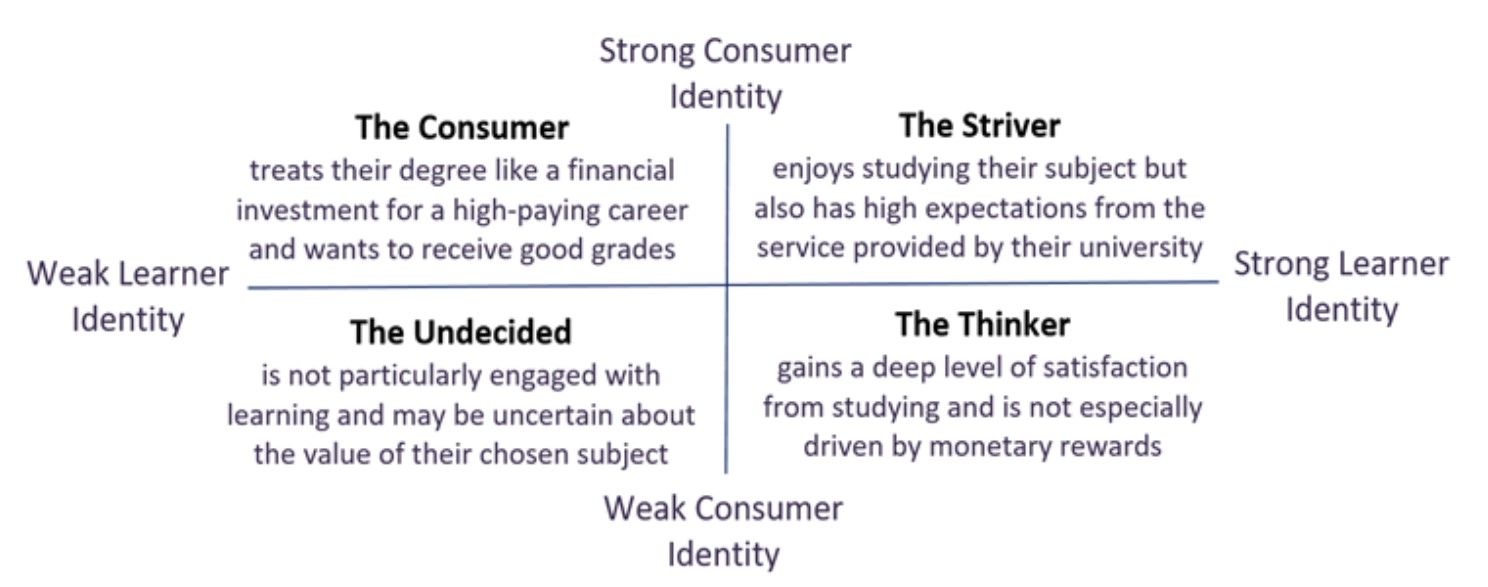Ever since the Competition and Markets Authority (CMA) issued guidance clarifying that (most) students are, in law, “consumers”, people have been telling me that the student-as-consumer model is bad.
Specifically, one of the aspects of that has been repeated reference to research that apparently shows that students who think and act like “consumers” have worse academic outcomes.
I’ve been putting off properly interrogating the source for the claim since shortly before the pandemic. But I’ve finally found the 30 minutes to knock loose this particular barnacle from the to-do list. And you will believe what happened next.
Poor performance
The framing in The student-as-consumer approach in higher education and its effects on academic performance is basically marketisation, the tripling of tuition fees and governments encouraging students to see themselves as consumers. Academics have rejected the frame, but there hasn’t been actual evidence on why it’s bad for academic performance/attainment until now.
The literature review is good, insofar as it represents a handy rundown of all the usual critiques of the funding model and its impacts on students – plus to balance that, there’s a recognition that the approach may have advantages for the student because it involves a shift in power from provider to consumer:
Consequently, standards and quality of service are expected to rise because customers have control over expectations and evaluate services by their capacity to fulfil their demands.”
The study itself is interesting – a survey of over 600 undergraduates at higher education institutions in England about attitudes and behaviours in relation to their higher education, learner identity, and their academic performance.
It found that consumer orientation “mediated traditional relationships between learner identity, grade goal and academic performance”, and basically found that a higher consumer orientation was associated with lower academic performance.
The “good” news? On average, a tendency to disagree or be neutral towards the “consumer” statements, and general agreement with “learner” statements.
I’ve skim-read all of that a few times since 2016, and it has never rung true for me. The students I talk to who want more focus on students, promises to be kept, enforceable rights and better value for money were usually really bright achievers. But maybe, I’ve always thought to myself, I have a “he chats to reps” bias.
Anyway, I’ve finally found the source of my… unease.
Digging into the discourse
The “student as consumer” frame that students were invited to reflect on in the study took the form of a questionnaire adapted from a 2014 US study called They do not buy it [geddit?] Exploring the extent to which entering first-year students view themselves as customers.
Q1 asks students to likert-reflect on the extent to which they agree that:
The main purpose of my university education is to maximise my ability to earn money”.
Apparently this is an example of “customer orientation”.
I think it’s more an example of the extent to which students think the purpose of education is about earning more money. In other words, it’s perfectly possible for students to value education on pleasure or intrinsic terms – but still demand consumer rights when they pay for it. Like when I go to the cinema or pay for a book.
Q2 plays a similar game:
I only want to learn things in my courses that will help me in my future career”
That’s a question that is about a focus on one’s future career, not being a customer/consumer per se. See also Q4:
If I cannot earn a lot of money after I graduate, I will have wasted my time at university”
Things get interesting at Q5:
As long as I complete all of my assignments, I deserve a good grade”.
That appears to define a customer/consumer as passive/selfish. But it is possible to be an active consumer who realises that demanding good outputs from the gym equipment/staff won’t automatically makes you fit.
Q9 is similar:
It is solely the lecturer’s responsibility to educate me at university”
As is Q11 (scores reversed):
Although I have paid to attend university, the university does not owe me a degree”
Almost all of the questions are variations on those two themes, where the assumption is that “consumer” means either someone keen for an economic benefit to flow from their learning, or means that someone expects benefits to flow merely from purchase without effort.
It’s a problem, because I can think of lots of purchases I make of services, experiences or products where I don’t expect an economic benefit and where I understand and accept that they’ll only “work” if I put some effort in. And in all of those cases, I still expect to have promises kept, minimum standards over what is supplied, and rights to redress.
As well as those two dominant frames, the survey also asked about what we might call a “learner” mindset – “I prepare for class” and “I want to learn as much as possible while at university” and so on.
These aren’t concepts that are antithetical to being a consumer. Holidaymakers, for example, are consumers/customers and some prepare to make the most of it, while some don’t. But it’s not only those who don’t prepare that have the right to a refund if the pool by their hotel in the brochure is unbuilt when they arrive.
Rights and ambitions means worse
The problem with all this is that you end up with a headline – and summarised tweets – that says that framing students as consumers “means they do worse”. But in reality what the study tells us is that students who are lazy, don’t take their studies seriously and don’t care much about learning… don’t do as well. You don’t say.
Despite misleading slides that say things like “Are you a student learner or a consumer of your education”, the detail in the research doesn’t suggest that “consumer” and “learner” are always automatically conceptual opposites – and indeed the author(s) have subsequently developed an interesting set of resources for staff to use with students that explain the concepts:

But the focus of those resources seems to be about taking students who are on the left-hand side of the heuristic and supporting them to move to the right hand side – which will cheer up staff that are frustrated with the motivation and attitudes of their students as learners, but won’t help students who are desperate for a career or who are being let down. As such, can make a decent argument for also taking steps to move people from the lower half to the upper half, as long as we define student-as-consumer properly. More strivers now!
The thing is, most students are perfectly capable of understanding themselves in multiple ways simultaneously – as members of a university community with responsibilities to others, clients of a set of support services, learners that have to expend effort to generate educational outcomes, and even consumers with the right to have educational services carried out with reasonable care and skill, have promises kept and rights to redress if the other side of the partnership fails.
Do some try it on? Yes they do. But the fact that the woman in front of me at the TK Maxx returns desk yesterday was suggesting she’d only once worn the shoes she was trying to return was blatantly lying isn’t a reason to repeal the Consumer Rights Act 2015.
Crucially in all this, students know they’re not buying a fridge. Some in the sector love to say “well students aren’t passive consumers” as if “active consumer” is oxymoronic. But students are, and know they are, “active” consumers.
That we keep developing ways to try to convince them that not having rights to redress, or rights to minimum standards, or rights to promises kept, or consistent service provision is somehow the only way to be a “real” or “pure” student is pretty miserable.
And worse still is the idea that academic staff might meet students who are assertive about their consumer rights, or are ambitious about their career, and then therefore conclude that those students are somehow selfish, lazy, or expect their marks on a plate.














So students are a little more complicated than we might think, who would have thought? Work we did with the University of Utah showed around just under half were ‘investors’ I go to university because I want a job and good career, a similar proportion were ‘learners’ I’m here because of the joy of learning and the rest were ambiguous or a bit of both. The challenge, as it seems to me is meeting the needs of all three types.the sector as a whole gives the impression that attending to the investors’ needs is somehow tainting the offer, while pushing the importance of education for social mobility. So, we have as much cognitive dissonance as those we teach.